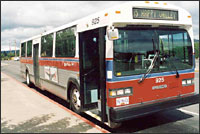 |
|
Goals and Core Business AreasThe ministryís work is organized into five core business areas:
The Minister is also responsible for:
The ministry has established four primary goals. Working toward these goals will assist in the achievement of the ministryís vision and mission. Each goal is supported by one or more business areas, as follows:
|
|||||||||||||||||||||||||||||||||||||||||||||||||||||||||||||||||||||||||||||||||||||||||||||||||||||||||||||||||||||||||||||||||||||||||||||||||||||||||||||||||||||||||||||||||||||||||||||||||||||||||||||
| Highway Operations |
2002/03 Restated Estimates |
2003/04 Estimates |
2004/05 Plan |
2005/06 Plan |
| Operating Expenses ($000) | ||||
| Expenditures | 447,004 | 454,815 | 417,827 | 420,072 |
| Ministry
Capital Expenditures (Consolidated Revenue Fund) ($000) |
||||
| Capital Expenditures (CRF) | 4,140 | 5,150 | 2,543 | 4,888 |
| Consolidated Capital Plan (CCP) ($000) | ||||
| Capital Rehabilitation Expenditure (recoverable from BCTFA) | 165,000 | 165,000 | 165,000 | 146,000 |
| Full-time Equivalents (FTE) | ||||
| FTEs | 1,103 | 964 | 602 | 602 |
Capital rehabilitation expenditures include Oil and Gas II program funding in 2002/03 through 2004/05.
The number of full-time equivalent positions in Highway Operations is forecast to drop by 45 per cent. In large part, this will result from the privatization of selected operations (sign shop, electrical operations, pavement marking, radio systems and inland ferries). A Coquihalla partnership agreement would also reduce the ministryís staff complement.
Effective April 1, 2003, the ministry is to assume responsibility for commercial vehicle weigh scales, previously with ICBC.
 Transportation
Improvements
Transportation
Improvements
The Transportation Improvements business area encompasses three program areas:
- Transportation Policy and Legislation, providing guidance on the development of transportation, highway and corporate policy and legislation;
- Partnerships, focusing on the development of partnerships with the private sector and other levels of government, and on making efficient use of property under the ministryís jurisdiction to reduce the cost to taxpayers of new highway facilities; and,
- Planning, Engineering and Construction, responsible for highway planning, capital program development and monitoring, investment strategies, quality management, access management, direction and management of projects, engineering, survey and design, construction, and property acquisition for provincial highways.
| Transportation Improvements |
2002/03 Restated Estimates |
2003/04 Estimates |
2004/05 Plan |
2005/06 Plan |
| Operating Expenses ($000) | ||||
| Expenditures | 16,481 | 13,536 | 12,297 | 12,197 |
| Ministry
Capital Expenditures (Consolidated Revenue Fund) ($000) |
||||
| Capital Expenditures (CRF) | 1,350 | 974 | 595 | 575 |
| Consolidated Capital Plan (CCP) ($000) | ||||
| Capital Expansion Expenditure (recoverable from BCTFA) | 89,020 | 132,800 | 135,700 | 126,700 |
| Full-time Equivalents (FTE) | ||||
| FTEs | 340 | 290 | 280 | 280 |
Motor Carrier Regulation
The Motor Carrier Regulation business area encompasses two programs:
- The Motor Carrier Commission (MCC), an independent body that regulates the provinceís commercial passenger industry (buses and taxis) pursuant to the Motor Carrier Act. The Commission, by delegation pursuant to the Motor Vehicle Transport Act (Canada), also issues licenses for the interprovincial and international road transport of passengers.
- The Motor Carrier Department, the administrative arm of the MCC that carries out investigations associated with motor carrier license applications. With other agencies, the department participates in compliance activities such as road checks, the investigation of complaints and random audits of the records of licensed motor carriers. The department is to be transferred to the ministry from ICBC effective April 1, 2003.
| Motor
Carrier Regulation |
2002/03 Restated Estimates |
2003/04 Estimates |
2004/05 Plan |
2005/06 Plan |
| Operating Expenses ($000) | ||||
| Expenditures | 595 | 1,804 | 1,610 | 1,610 |
| Full-time Equivalents (FTE) | ||||
| FTEs | 4 | 19 | 18 | 18 |
The Office of the Superintendent of Motor Vehicles (OSMV) was formerly part of this business area (previously called Motor Vehicle Regulation). This function more appropriately fits within the mandate of the Ministry of Public Safety and Solicitor General, and is to be transferred to that ministry at the end of March 2003.
 Public
Transportation
Public
Transportation
The Public Transportation business area encompasses annual provincial government transfers toward capital, operating, debt servicing and amortization costs associated with public transit and coastal ferry services.
| Public Transportation |
2002/03 Restated Estimates |
2003/04 Estimates |
2004/05 Plan |
2005/06 Plan |
| Operating Expenses ($000) | ||||
| Expenditures | 250,162 | 348,157 | 343,518 | 341,414 |
| Financing Transactions ($000) | ||||
| Prepaid Capital Advances | 155,070 | 46,390 | 5,560 | 4,190 |
The government transfer to British Columbia Ferry Services Inc. will begin in 2003/04.
The drop in the value of financing transactions after 2002/03 reflects substantial completion of the SkyTrain Millennium Line construction in Greater Vancouver.
 Executive
and
Executive
and
Support Services
The Executive and Support Services business area encompasses the ministerís and deputy ministerís offices; finance; administration; human resources; facilities management; information systems; service planning, reporting and performance measurement; and freedom of information, protection of privacy and records management.
| Executive
and Support Services |
2002/03 Restated Estimates |
2003/04 Estimates |
2004/05 Plan |
2005/06 Plan |
| Operating Expenses ($000) | ||||
| Expenditures | 20,390 | 16,054 | 14,599 | 14,558 |
| Ministry Capital Expenditures (Consolidated Revenue Fund) ($000) | ||||
| Capital Expenditures (CRF) | 2,375 | 326 | 1,275 | 1,050 |
| Full-time Equivalents (FTE) | ||||
| FTEs | 136 | 112 | 66 | 66 |
The number of staff positions in Executive and Support Services is forecast to drop by more than 50 per cent. This reflects anticipated staff reductions in other areas of the ministry, and therefore a reduction in support requirements, plus the transfer of positions to the BC Shared Services Agency. The agency recovers its costs from its clients, so MoT administrative expenditures will not decline in proportion to the reduction in ministry FTEs.
 |
||||
| |
|
|||
 Highway
Operations
Highway
Operations